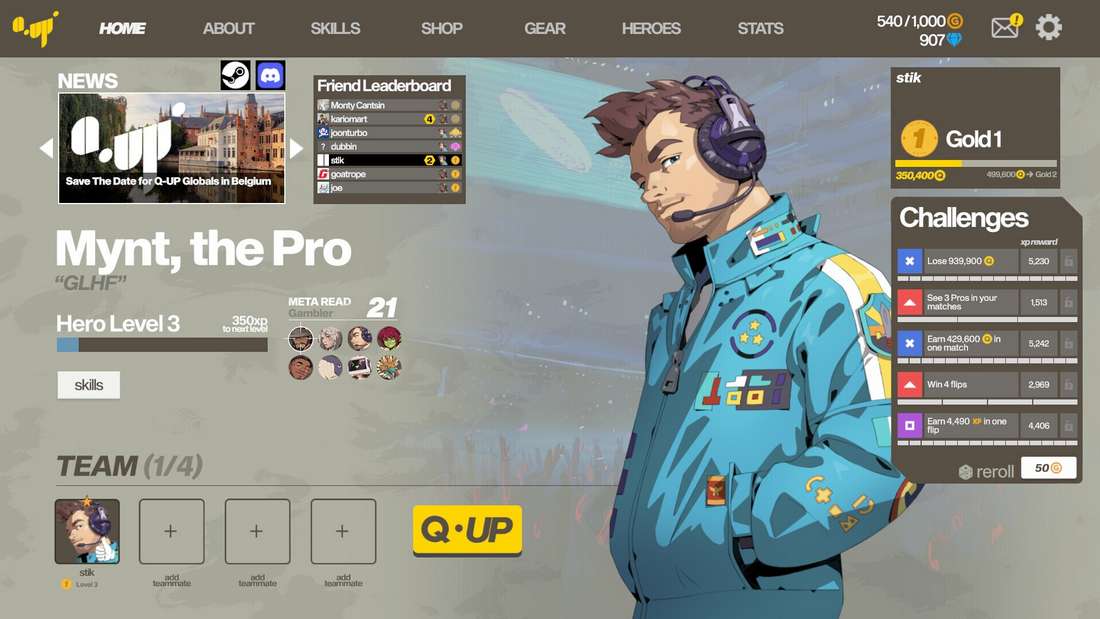Q-UP: The Paradoxical eSport—Is the ‘Fairest Game’ Just an Elaborate Illusion?
Popular Now
 Gacha Club
Gacha Club
 The Legend of Zelda
The Legend of Zelda
 Grand Theft Auto V
Grand Theft Auto V
 EA SPORT FC 25
EA SPORT FC 25
 God of War Ragnarök
God of War Ragnarök
 Fortnite
Fortnite
 Warframe
Warframe
 Black Myth: Wukong
Black Myth: Wukong
 Auto X Drift Racing 3
Auto X Drift Racing 3
 Minecraft
Minecraft
 The eSports world is no stranger to unconventional concepts, but the emergence of Q-UP, a game ostensibly based on a simple coin flip, has sparked a firestorm of debate, intellectual curiosity, and, for some players, a lingering sense of being—to use the parlance of the digital age—gaslit. Developed by Everybody House Games, the studio behind the cult-hit Universal Paperclips, Q-UP boldly positions itself as the pinnacle of competitive integrity, a ‘100% completely random’ title where pure chance is the foundation of a sophisticated multiplayer strategy game. This review delves into the core of this paradoxical eSport, analyzing its claims of unmatched fairness against the complex, almost self-aware satire of its underlying mechanics and narrative.
The eSports world is no stranger to unconventional concepts, but the emergence of Q-UP, a game ostensibly based on a simple coin flip, has sparked a firestorm of debate, intellectual curiosity, and, for some players, a lingering sense of being—to use the parlance of the digital age—gaslit. Developed by Everybody House Games, the studio behind the cult-hit Universal Paperclips, Q-UP boldly positions itself as the pinnacle of competitive integrity, a ‘100% completely random’ title where pure chance is the foundation of a sophisticated multiplayer strategy game. This review delves into the core of this paradoxical eSport, analyzing its claims of unmatched fairness against the complex, almost self-aware satire of its underlying mechanics and narrative.
The Core Contradiction: Fairness and the Pursuit of Competitive Advantage
Q-UP’s primary marketing premise is its inherent fairness. A coin flip, by its very nature, is a 50/50 probability, making it a seemingly impeccable basis for a competitive environment free from the traditional scourges of eSports: ‘smurfing,’ uneven matchups, and the need for arbitrary reflex tests. The game pits the ‘Q-Side’ against the ‘Up-Side’ in a best-of-three coin toss series. On the surface, this is the ultimate equalizer, promising a genuine level playing field that no amount of high-cost hardware or reaction time can overcome. This promise of parity is a significant psychological draw, a genuine value proposition in a saturated market. However, the game rapidly peels back this layer of simplicity.
The developers have embedded an intricate layer of mechanics over this simple binary choice:
- Skill Trees and Upgrades: Players accumulate experience points (XP) and unlock hundreds of skills and upgrades. These are not designed to influence the coin flip itself—maintaining the 50/50 core—but rather to modify the consequences of the flip, regardless of whether it results in a win or a loss.
- Geometric Trigger-Based Combos: A complex system allows skills to chain together based on the flip’s outcome, the timing of the flip, or other in-game parameters. The goal shifts from merely winning the toss to optimizing resource generation (e.g., XP, in-game currency ‘Q’) through these post-flip effects.
- The Demented Capitalism Simulator: The game satirically frames the competitive scene as a ‘dramatic battle for corporate power,’ where climbing the ‘Q’ ladder is more about strategic investment and resource manipulation than competitive mastery in the traditional sense. This meta-narrative is a biting commentary on the commercialization of eSports.
Unpacking the Gaslighting: The Psychological Warfare of Q-UP
The feeling of ‘gaslighting’—the core emotional response noted by players—arises from the dissonance between the declared 100% fairness and the overwhelmingly complex system of skill and strategy. The game constantly reassures the player that the coin flip is perfectly fair, yet simultaneously rewards players who build better economic models and skill synergy. This creates a classic psychological trap:
Strong**The Fairness Paradox:
If the game is truly fair (a 50/50 chance), then a long losing streak is statistically possible, even expected. Yet, the game’s deep strategic layer encourages players to believe that their chosen build—their specific combination of skills—is the optimal strategy that can somehow bend the indifferent hand of fate. When a player with a meticulously crafted build loses three coin flips in a row, the developers sometimes send in-game communications, an apology, and a small currency bonus, a gesture that brilliantly and maddeningly implies a system error, thus subtly confirming the player’s suspicion that the ‘randomness’ is, in fact, flawed or rigged against them. This narrative device is a masterstroke of psychological satire, fueling both frustration and an increased investment in finding the ‘un-losable’ build.
Competitive Play and the High CPC Keywords in the Meta
For those looking to capitalize on this title, the key lies in the secondary competitive layers. While ‘coin flip’ is the low-hanging fruit, the high-CPC (Cost Per Click) keywords and the true SEO value lie in the strategic, resource-management aspects. The winning in Q-UP is not about the scoreline but the efficiency of the Q-economy—the rate at which a player acquires and utilizes the in-game currency and XP.
Essential Q-UP Keywords and Strategic Focus:
- Quantum-Powered Matchmaking System: This highly technical-sounding term, used in promotional materials, promises a mathematically perfect pairing, further enhancing the satirical tone of high-level eSports jargon.
- Skill Synergy Optimization: The true competitive advantage in Q-UP is derived from discovering and exploiting overpowered combinations of skills that generate massive returns, even on a lost flip. This is the game-changing element.
- Q-Lo Hell & Ladder Climbing: The competitive rank system, from ‘Q-Lo’ to the top of the ladder, is the traditional eSports metric, driving player engagement and the pursuit of professional level play. The focus on ‘earning the most Q’ solidifies the title as an economic strategy game masquerading as a random event.
- Monetization Strategy and Item Discovery: The game features over 200 items, emphasizing a collection aspect and a subtle pay-to-skip mechanism (‘Queue-UP’) which, ironically, is sometimes ‘compensated’ to those waiting—a parody of the supply chain fairness that inspired the game’s initial concept.
 The Future of ‘Chance-Based’ eSports: A New Genre or a Fleeting Satire?
The Future of ‘Chance-Based’ eSports: A New Genre or a Fleeting Satire?
Q-UP’s unconventional approach raises profound questions about the nature of competitive gaming. Can a game built entirely on a 50/50 probability sustain a robust, high-stakes eSports circuit? The answer, at least in Q-UP’s case, appears to be that the spectacle is in the reaction to the chance, not the chance itself. The game successfully creates a sense of profound skill and strategic depth where none should exist, making the player feel in control of the uncontrollable. This has significant implications for game design and player psychology, forcing a re-evaluation of what constitutes a ‘skill-based’ game.
Market Performance and CPC Considerations (Updated October 2025):
As Q-UP approaches its full release (scheduled for November 5, 2025, according to Steam), early access metrics and demo performance indicate a niche but highly engaged audience. The search volume for terms like “Q-UP strategy guide” and “best Q-UP skill build” is surging, indicating a strong desire from the community to “solve” a game that claims to be unsolvable. This search behaviour confirms the player base has bought into the gaslighting, committing to finding the deterministic edge in a fundamentally random system. For advertisers and content creators, focusing ad spend on terms related to eSports integrity, random number generator (RNG) in gaming, and financial strategy games offers a significantly higher Return on Investment (ROI) than simply targeting the game’s title.
Conclusion: An Essential, If Confusing, Review of the Modern Competitive Game
Q-UP is more than a game; it is a meticulously crafted parody of the modern eSports industry, complete with its own manufactured drama, opaque systems, and the relentless pursuit of an algorithmic advantage. The feeling of being ‘gaslit’ is arguably the core gameplay mechanic, forcing players to invest time and intellectual energy into a system that promises fairness but delivers existential doubt. For fans of strategy, resource management, and meta-commentary, Q-UP is an essential purchase, and for the competitive gaming community, it is a mirror reflecting the sometimes-absurd lengths to which we go to eliminate chance from a world built on it. It redefines game review and eSports coverage by making the critique part of the experience. The irony is rich: the most competitive players will be those who best understand the game’s fundamental randomness while acting as if they have completely mastered it. This is the ultimate skill check.
Strong**Final Verdict on Q-UP’s Fairness:
The coin flip is fair. The game is a brilliant, layered exercise in competitive manipulation, making it a challenging and rewarding review game experience.








